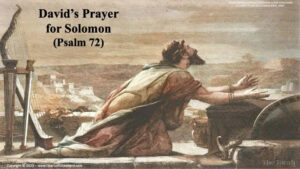Canon Rob's Reflections
A prayer for the nation's leaders
A Reflection on Psalm 72 by Canon Rob
15th February 2026, The Sunday next before Lent
 With Easter coming at the beginning of April this year, we are already approaching Lent and today’s psalm, the one actually set for Morning Prayer, speaks of judgement and the need for justice. Some of my commentaries suggest that Psalm 72 is a prayer of Solomon asking that God will give him wisdom to lead the people justly. [See 1 Kings 3.5-9.] Whether or not that is so, it is certainly a “royal psalm” which may have been used at a coronation or the annual celebration of a king’s accession to the throne. Justice is a key theme for all the king’s subjects and especially for those who are poor and oppressed. The opening verse sets the scene, “Give the king your judgements, O God..” The assumption is that without these, leaders cannot rule well. How often we pray for the world’s leaders today, that they will be guided by God! Verse 3 can be seen as a metaphor for the good that will come from being led with justice: “May the mountains bring forth peace, and the little hills righteousness for the people.” It is about a harvest of prosperity for all people and verse 4 shows why those who are lowly are included: “May he defend the poor among the people, deliver the children of the needy and crush the oppressor.” Such a king is good news for his nation and verse 5 is a prayer that he may live and reign for a long time, a reminder of our National Anthem.
With Easter coming at the beginning of April this year, we are already approaching Lent and today’s psalm, the one actually set for Morning Prayer, speaks of judgement and the need for justice. Some of my commentaries suggest that Psalm 72 is a prayer of Solomon asking that God will give him wisdom to lead the people justly. [See 1 Kings 3.5-9.] Whether or not that is so, it is certainly a “royal psalm” which may have been used at a coronation or the annual celebration of a king’s accession to the throne. Justice is a key theme for all the king’s subjects and especially for those who are poor and oppressed. The opening verse sets the scene, “Give the king your judgements, O God..” The assumption is that without these, leaders cannot rule well. How often we pray for the world’s leaders today, that they will be guided by God! Verse 3 can be seen as a metaphor for the good that will come from being led with justice: “May the mountains bring forth peace, and the little hills righteousness for the people.” It is about a harvest of prosperity for all people and verse 4 shows why those who are lowly are included: “May he defend the poor among the people, deliver the children of the needy and crush the oppressor.” Such a king is good news for his nation and verse 5 is a prayer that he may live and reign for a long time, a reminder of our National Anthem.
 Not only may he live for many years, the prayer for the king in the psalm is that his kingdom may grow, so that justice will spread and more people will enjoy the benefits. “May his dominion extend from sea to sea and from the River to the ends of the earth.” [Verse 8.] Other leaders will look up to this king, even kneel before him [see verses 10 and 11] all because he “shall deliver the poor that cry out, the needy and those who have no helper.” [Verse 12.] Similar phrases are found in verses 13 and 14 all of them taking up the key theme of justice. We know from the Book of Kings that Solomon’s long reign was one of justice, but he realised he had a difficult task being the son of King David and he therefore had a lot to live up to. Solomon’s prayer for wisdom then will have been offered to God knowing that all that was good about David’s reign should be continued through his reign. David’s throne was established in love, primarily his love for God and it is this which leads us to think beyond the psalm to Jesus. The Jews had long awaited the coming of a Saviour, the Messiah, the King who would rule the world with justice and mercy and it was clearly part of God’s plan that Jesus was born of the house of David. Matthew’s Gospel begins with a “Table of Descent of Jesus Christ, son of David, son of Abraham” and as the story unfolds, we read that the angel of the Lord appeared to Joseph in a dream and in it, Joseph is referred to as the “son of David.”[See Matthew 1.18-25.]
Not only may he live for many years, the prayer for the king in the psalm is that his kingdom may grow, so that justice will spread and more people will enjoy the benefits. “May his dominion extend from sea to sea and from the River to the ends of the earth.” [Verse 8.] Other leaders will look up to this king, even kneel before him [see verses 10 and 11] all because he “shall deliver the poor that cry out, the needy and those who have no helper.” [Verse 12.] Similar phrases are found in verses 13 and 14 all of them taking up the key theme of justice. We know from the Book of Kings that Solomon’s long reign was one of justice, but he realised he had a difficult task being the son of King David and he therefore had a lot to live up to. Solomon’s prayer for wisdom then will have been offered to God knowing that all that was good about David’s reign should be continued through his reign. David’s throne was established in love, primarily his love for God and it is this which leads us to think beyond the psalm to Jesus. The Jews had long awaited the coming of a Saviour, the Messiah, the King who would rule the world with justice and mercy and it was clearly part of God’s plan that Jesus was born of the house of David. Matthew’s Gospel begins with a “Table of Descent of Jesus Christ, son of David, son of Abraham” and as the story unfolds, we read that the angel of the Lord appeared to Joseph in a dream and in it, Joseph is referred to as the “son of David.”[See Matthew 1.18-25.]
 The next three verses of today’s psalm are a prayer for this Davidic king who will receive tributes [see verse 15] and who, as we read in verse 16, will bring prosperity to the land and the peoples. We read these verses looking back and can think of Jesus, but the author of the psalm could only hope and pray for the coming of the Messiah, the King whomever God would send. We always need to take care we don’t read into the scriptures what is not there but, as the Epiphany season reminded us, we celebrate the coming of this King of Kings who was born to save all humanity and who is worshipped even by strangers from afar. We continue to rejoice with those who recognised in Jesus a fulfilment of a long held promise, praying the words of the doxology in verses 18 and 19. These final words were not part of the original psalm but added as an end to what is the second book of the whole Psalter. As you read them, offer them to God as an act of praise and thanksgiving for all that God has done, and continues to do, in a through His Son our Saviour who is alive and reigns now and forever.
The next three verses of today’s psalm are a prayer for this Davidic king who will receive tributes [see verse 15] and who, as we read in verse 16, will bring prosperity to the land and the peoples. We read these verses looking back and can think of Jesus, but the author of the psalm could only hope and pray for the coming of the Messiah, the King whomever God would send. We always need to take care we don’t read into the scriptures what is not there but, as the Epiphany season reminded us, we celebrate the coming of this King of Kings who was born to save all humanity and who is worshipped even by strangers from afar. We continue to rejoice with those who recognised in Jesus a fulfilment of a long held promise, praying the words of the doxology in verses 18 and 19. These final words were not part of the original psalm but added as an end to what is the second book of the whole Psalter. As you read them, offer them to God as an act of praise and thanksgiving for all that God has done, and continues to do, in a through His Son our Saviour who is alive and reigns now and forever.
“Blessed be the Lord, the God of Israel, who alone does wonderful things.
And blessed
be his glorious name for ever. May all the earth be filled with his glory. Amen. Amen.”
Canon Rob’s Reflections on the Psalms
During 2026 the Reflections will based on one of the psalms set for the FIRST and THIRD Sundays of each month.
As usual they will be on this website and hard copies will available on the chest in church, including that for today.

